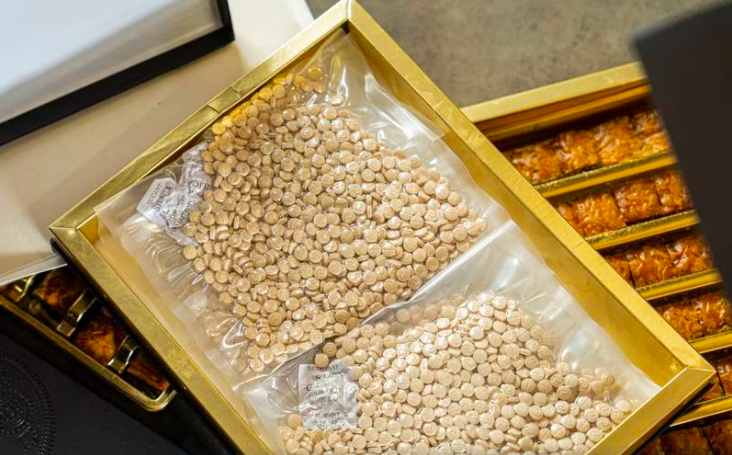Over the weekend, authorities in Saudi Arabia made a historic seizure at Jeddah’s Islamic Port after the inspection of a shipment of baklava led to the daunting discovery of over two millions pills of Captagon, an amphetamine-type stimulant usually used for drug trafficking and consumption, hidden under the stacked trays of one of the region’s favorite sweets.
Upon receiving the cargo of goods, the container was naturally subjected to a thorough inspection, conducted by officials of the Zakat, Tax and Customs Authority (ZATCA), which then led to the uncovering of the prohibited products. The border patrol eventually deemed it necessary to call on support from the General Directorate of Narcotics Control (GDNC) to identify and locate the individuals who intended to receive the load of highly-addictive tablets. The cooperative effort eventually bore its fruits as the two agencies successfully arrested two men in the hours following the seizing, however, they have refused to communicate publicly on the origin of the batch as well as the nationality of the individuals taken into custody.
The shocking find has sent ripples of concern throughout both the international community and the region, highlighting the ever-evolving tactics employed by illicit drug networks to smuggle their overflowing supplies. Simultaneously, the capture also sheds light on the rapid rise of this specific synthetic drug across the Middle East, to the extent that it has grown into a prominent topic in diplomatic conversations in the Arab World in recent times.
As it happens to be, the Syrian Republic is the region’s highest Captagon producing country, and with such substantial amounts at disposal, large quantities of the drug have now managed to make their way outside of the war-torn state, which is still coming to terms with its regime, as well as the aftermath of the Arab Spring following nationwide protests in March 2011.
According to a report from the Middle East Institute, law enforcement authorities around the globe seized a staggering $3.5 billion worth of Syrian-made Captagon in 2020; an amount that is more than four times the value of Syria’s legal annual exports, which were valued at $800 million that same year. As you can imagine, the primary recipients of these exports are bordering nations, primarily Jordan and Lebanon, however, Captagon’s influence has gone past its initial sphere of influence, having now extended its reach to the Gulf, triggering serious concerns on its way by all parties that have been affected so far.
The contagious narcotic wave, which is showing no signs of slowing down, has resulted in an entire reassessment of Syria’s role and perception by its peers, with several members of the Arab League, which Syria had been forced out of 11-years-ago, pushing for the country’s reintroduction almost solely for the purpose of stopping the issue from escalating any further than it already has. In May, the notoriously infamous leader of the Levantine State, Bachar El-Assad, received an invitation to participate in a summit held by the ethnocentric political coalition in Riyadh, with the primary intention of tackling the Captagon epidemic altogether, despite the complex geopolitical history and track record of human rights abuses that had previously led to Syria’s estrangement from the league in the first place.
Used by entities within the Islamic State to turn “fighters into superhuman soldiers” as much as partygoers across the region which have now labeled it as the “poor man’s cocaine,” the recent seizing of Captagon in Saudi Arabia will adamantly push the conversation on how to tackle the issue back to being a priority on most agendas— but at what cost? As Syria still struggles to stand on its two legs with a despot in charge, and millions of civilians that have either fled or lost their lives since the start of the conflict, it’s worth wondering whether the focus on curbing drug trafficking might divert the already scarce resources and attention from addressing the broader humanitarian crisis that continues to unfold in the East Mediterranean country.









